- Home
- Allison Brennan
Kiss Me, Kill Me Page 2
Kiss Me, Kill Me Read online
Page 2
Though the corpse didn’t appear to be intentionally hidden, waist-high weeds and a small building that had once housed a generator or dumpsters concealed her from any passerby’s cursory glance. Suzanne stepped away from the squat structure and looked across the Upper Bay. The tiny Gowanus Bay was to the north, the New Jersey skyline to the west. At night, it would be kind of pretty out here with the city lights across the water, if it weren’t so friggin’ cold.
A plainclothes NYPD cop approached with a half-smile that Suzanne wouldn’t call friendly. “If it ain’t Mad Dog Madeaux. We heard this was one of yours.”
Suzanne rolled her eyes. Even with her eyes closed, she’d recognize Joey Hicks by his grating, intentionally exaggerated New York accent.
“No secret,” she said, making notes to avoid conversation. Hicks wasn’t much older than she. Physically fit, he probably thought he was good-looking, considering the swagger. She supposed he had some appeal, but the cocky “all Feds are assholes” attitude he’d displayed the first time they’d met on a murder case had landed him on Suzanne’s permanent shit list years ago.
She looked around for his supervisor, but didn’t see Vic Panetta. She’d much rather deal with the senior detective, whom she liked. “Who found the body?” Suzanne asked.
“Security guard.”
“What’s his story?”
“Found her on his morning rounds, about five-thirty.”
It was eleven now. “Why hasn’t the body been taken to the morgue?”
“No wagon available. Coroner is on the way. Another hour, they say. NYPD doesn’t have the resources you Feds got.”
She ignored the slight. “What was the guard doing here last night? Does he patrol more than one building?”
“Yeah.” Hicks looked at his notes. Though Suzanne didn’t like him, he was a decent cop. “He clocked in at four a.m. for a twelve-hour shift. Rotates between vacant properties throughout Sunset Park and around the bay. Says he doesn’t stick to a specific schedule, ’cause vandals watch for that.”
“What about the night guard?”
“Night is either Thompson or Bruzzini. According to the day shift, Bruzzini is a slacker.”
“I need their contact information.” She hesitated. Then—remembering her boss’s command to be more collegial to NYPD—she added, “I appreciate your help.”
“Did hell freeze over since the last time we worked a case?” Hicks laughed. “I’ll get Panetta; I’m sure he’ll want to at least make a show of fighting for jurisdiction.” He left, still grinning.
Suzanne ignored him. There were no jurisdictional issues—after the third similar murder, an FBI–NYPD task force had been formed. Her supervisor was administratively in charge, and she was the FBI point person on the case. Panetta was the senior ranking NYPD detective.
Tired of her hair flying in her face, Suzanne pulled a N.Y. Mets cap from her pocket and stuffed under it as much of her thick, tangled mess as possible. In her small notepad, she finished writing down her observations and the few facts she knew.
This victim, the fourth, was the first found in Brooklyn. Victim number one, a college freshman, had been killed up in Harlem on a street popular with squatters and the party crowd because every building was boarded up. That had been the eve of Halloween. The second victim had been discovered on the south side of the Bronx, ironically overlooking Rikers Island, on January second. The third victim—the one who brought the attention of the FBI to the serial murders—had been killed in Manhattanville, near Columbia University, eighteen days ago. By the time the task force was put together and evidence shared, for all practical purposes Suzanne had been working the case for less than two weeks.
Besides the one missing shoe and the age of the victims—all adult females under twenty-one—two other commonalities stood out: the victims had been suffocated with a plastic bag that the killer took with him, and they’d each been killed near an abandoned building with evidence of a recent party.
Secret or underground parties were nothing new. Some were relatively innocent, with drinking, dance music, and recreational drugs, while others were far wilder. Raves in the United States had started in Brooklyn in the abandoned underground railroad tunnels, and while they still existed, they’d peaked in popularity a while back. The new fad was sex parties with heavy drinking and hard-core drugs. Music and dancing were precursors to multi-partner anonymous sex. Even before these murders, there had been several drug-related deaths associated with sex parties. If the pattern held true, evidence inside this warehouse would show that this Jane Doe had participated in the latter type of party, which Detective Panetta called “extreme raves.”
The press had dubbed the killer the Cinderella Strangler when someone in the know had leaked the missing-shoe detail to the press. It may not have been a cop who had talked—there were dozens of people working any one crime scene—but most likely it had come from inside the NYPD. The press didn’t seem to care that the victims weren’t strangled—they were asphyxiated. The Cinderella Asphyxiator just didn’t sound as good on the eleven o’clock news.
Suzanne had sent a memo to all private security companies in the five boroughs asking them to be more proactive in shutting down the rampant parties at abandoned sites, but it was like a game of whack-a-mole—when authorities shut down one location, two more sprang up.
Though only two of the first three victims were college students, she’d contacted local colleges and high schools to warn students that there was a killer targeting women at these parties. Unfortunately, Suzanne suspected that getting through the invincible it-won’t-happen-to-me mentality of young adults was next to impossible. She could almost hear their reasons. We won’t go out alone. We won’t leave with a stranger. We won’t drink too much. Plans for every day of the week, but when it was life or death, Suzanne didn’t understand why they couldn’t party in the relatively safe dorms and frat houses. Those venues had their own problems, but they probably didn’t have a serial killer trolling their halls.
“Suzanne!”
She looked up and waved to Vic Panetta as he strode over. She liked the wiry Italian. He was her exact height, five foot nine, and wore a new wool coat, charcoal gray to match his full head of hair. “Hi, Vic,” she said as he approached. “New coat?”
He deadpanned her. “Christmas present from my wife.”
“Very nice.”
“It cost too much money for a label no one can see,” he grumbled. He gestured at the tarp. “We photographed the area, then put the tarp over the body so we don’t lose any more evidence.”
“Well, the way this wind has been going nonstop for the past couple days, I think we already lost it.”
“You take a look?”
“Briefly.”
“You noted the missing shoe?”
“Duly.”
“Could be under the body.”
“You think?”
“Nah.” He shook his head, then pulled his phone from his coat pocket and read a message. “Good news, coroner is on the way. ETA ten minutes.”
About time, Suzanne thought but didn’t say out loud. “Hicks said you were talking to the security guard who found the body?”
“Yeah, he’s former NYPD—permanent disability, works three days a week. Takes his job seriously. Got an earful about the night shift.”
“Anything I need to know?”
“He suspects Ronald Bruzzini of being bought off. Too much cash in the guy’s wallet, but no proof.”
“Your guy knew about the parties?”
Panetta shook his head. “Not until after the fact, and he doesn’t work nights. He thinks Bruzzini looks the other way. Finds evidence of all kinds of wild parties nearly every week. Hicks and I will follow up on both the night guards, see what shakes out.”
“So you think this was one of your extreme raves?” she teased.
He rolled his eyes and let out an exasperated breath. “And then some. They did some cleaning up inside, but left the garbage on t
he other side of the building. The wind sent it all over kingdom come. The crime scene unit is working inside and out, but contamination is a huge problem. We’re printing the place, but getting anything usable—”
“I know. A couple hundred stoned kids, a complete mess, limited resources. If you need our lab, let me know.”
“Will do.”
NYPD had a decent crime lab, and since it was local Suzanne preferred to keep evidence here. Because Panetta was a well-respected, well-liked twenty-two-year veteran, he worked the system well, and most of the time could get results faster than if Suzanne shipped evidence to the FBI lab at Quantico.
“The press is going to be all over this,” Panetta mumbled.
“No comment.” She never spoke to the press—not after her diatribe five years ago during a missing-child case. That had landed her on the evening news and in front of the Office of Professional Responsibility. Further, she’d been left with the irritating and unflattering moniker “Mad Dog Madeaux.”
“We got a lot of nothing,” Panetta said.
There was extensive physical evidence on all of the victims’ bodies, but nothing they could use to track the killer. The first three victims had had at least two sex partners within twenty-four hours of their death, but the DNA left behind had either been contaminated or hadn’t brought up a match in the system. They had evidence of seven different males total among the first three victims, but none were the same, suggesting that the killer went to extraordinary lengths to avoid leaving DNA on his victims, and possibly didn’t have sex with them. Because of the multiple sex partners and the nature of these parties, the coroner could not determine whether the victims had been raped or had had consensual sex.
Not having conclusive evidence as to a killer’s motive made profiling him that much harder. A sexual sadist had a different profile than, for example, a man who killed prostitutes because he thought they were whores. Serial killers who raped or tortured their victims would have a different profile than those who didn’t sexually molest their victims. The task force couldn’t even pinpoint whether this killer was one of the partygoers or whether he waited nearby for a lone female to attack.
Whatever was used to suffocate the victims was taken by the killer—along with one of the victims’ shoes—and their bodies weren’t moved. They were dead when they fell to the ground.
Panetta said, “By the way, this one didn’t die last night.”
“I didn’t inspect the body that closely.”
“The day guard only works Wednesday through Saturday. He doubts that the other day guy does much more than a slapdash inspection of the properties. Our Jane Doe might have been here as early as Saturday night.”
“Because?”
“Our ex-cop walked through here on Saturday afternoon and she wasn’t here then.”
“And you don’t think he’s the killer?” She was only half joking.
“No, but I’ll check him out anyway. I did take a long look at the body, and rigor has come and gone. She’s probably been here more than forty-eight hours. The coroner should be able to give us a range.”
“I’ll leave the forensics in your capable hands. I need her identity ASAP, and in the meantime I’ll review the other three victims and reinterview friends. Someone knows something. I’m getting damn pissed at these bratty college kids who zip their lips because they don’t want to get in trouble for illegal drugs and parties, but don’t seem to care that a killer is hunting on their turf.”
TWO
Kirsten Benton had been missing for five days.
Because she’d been dubbed a habitual runaway for her tendency to disappear on the weekends, the Woodbridge, Virginia, police didn’t take this episode seriously. Sean Rogan, however, took it very seriously, because Kirsten had broken her pattern.
The other half-dozen times she’d disappeared, she’d returned home by Sunday night. Now it was Wednesday, and her cell phone was going straight to voice mail. Sean had already tried to trace the GPS on her phone but got nowhere. He suspected that she’d either turned it off or the battery was dead.
It could have been an easy case, but now Sean and his partner, Patrick Kincaid, had a lot of legwork—and fingerwork on the computer—ahead to track down the high school senior. Patrick was at the Woodbridge police department talking to the detective in charge of missing persons about Kirsten and retrieving a copy of all the missing-person reports her mother had filed over the past six months. They hoped there was a pattern and they could figure out where she went.
Sean was doing the fingerwork at the Benton household on Kirsten’s computer. Teenagers lived for their electronic toys, and between her social networking accounts and emails, he hoped to track her down before the end of the day.
Sitting at Kirsten’s desk in her bedroom, he first needed to get rid of Kirsten’s hovering mother, Evelyn, who stood behind him as he hacked her daughter’s computer password. He ran his hands through his brown hair in frustration but it fell back over his eyes. How was he going to kick a worried mother out?
“Your partner is talking to the police, but I don’t know that it’s going to do any good.”
Evelyn was Sean’s distant relative by marriage—well, he couldn’t even say that, since she’d divorced his uncle, Tim Benton, who was his mother’s stepbrother and not even a blood relative. But Sean’s brother Duke took family seriously—no matter how related or estranged or scattered.
Sean said, “If anyone can get the police to take Kirsten’s disappearance seriously, it’s Patrick. He used to be one of them.”
Patrick had joined RCK two years ago when Sean was still living in Sacramento. Three months ago, they had moved to Washington, D.C., and opened RCK East, both hoping to forge their own career paths away from the controlling guidance of their respective older brothers, who were principals in the protective-services company. RCK didn’t normally handle missing-person cases—the closest they came were overseas kidnappings—but the Bentons were family.
“Do you want me to call her friends again?” Evelyn asked.
“No, they’re in school right now. Did you make the list for me?”
“Yes—”
“Can you go over it again? Make sure you have their phone numbers and any other information you can think of—how much time Kirsten spent with them, any boyfriends or ex-boyfriends. Also, her school schedule and grades. Teachers’ emails and phone numbers—we’ll want to talk to them to see if Kirsten’s behavior has recently changed.”
He was trying to give Evelyn something to do, not start a conversation—he and Patrick had listened to her worries for two hours the night before and had all the information they needed to get started—but Evelyn continuted, “She hasn’t been herself since I moved here. It was the right thing to do. I couldn’t live in L.A. after what Tim did! Right?”
Sean had heard all about her ex-husband’s affairs and the nasty divorce and subsequent move three thousand miles away. Her then fourteen-year-old daughter hadn’t wanted to move east, but this was where Evelyn had found a job. Evelyn admitted at the beginning that she and Kirsten had had a strained relationship ever since the move to Virginia three years ago. The only reason Sean was here now was because Kirsten had never been gone this long, and Tim Benton had hired RCK to find her.
“Let’s find Kirsten first, then you two need to have a heart-to-heart, okay?”
“You know she’s only looking at colleges in California? She hates me.”
He flashed his dimple and blue eyes, and asked her kindly, “Evelyn, can you work on that list for me?”
She finally left the room. Sean felt bad for the woman, but he couldn’t do his job if he had to hold her hand. Earlier, he’d suggested that Evelyn ask a friend to come over for the day, but when he and Patrick had arrived, she’d been alone.
While his laptop ran through a code-breaking program Sean had written, he surveyed Kirsten’s sparsely furnished room. Most teenage girls—if his older sister had been a good example—had more
stuff than Kirsten Benton. Eden could have opened up a small department store with all her clothing and makeup, half of it strewn across the floor. Missing here were a teenage girl’s usual tiny bottles of makeup and perfume, along with the stuffed animals and knickknacks and general clutter. There weren’t even posters on the walls, save for a single beach scene above the desk.
He glanced at his program, which still had a few minutes left to run, then walked around the room taking a short video with his phone. The only place in the room with any sign of the girl’s personality was her desk. Almost hidden on a wall that could be clearly seen only when sitting at her desk was a corkboard filled with photographs of Kirsten and her friends, movie ticket stubs, and sticky notes with messages like English essay due MON!!! and Movies Wednesday—team.
Kirsten’s desk had books stacked up against the wall, and a short bookcase to the left was filled with the popular teenage books of the day—books about wizards and vampires and fallen angels. He flipped through a wall calendar, but it didn’t appear that she used it for anything specific. A friend’s birthday was marked in January, her dad’s in May. June 5 had a big red circle around it and a happy face, but he didn’t know what that signified since he knew Kirsten would be eighteen in April.
He picked up a stack of thick college brochures. University of San Diego, U.C. Santa Barbara, USC, Pepperdine. All Southern California colleges.
Sean glanced at the beach poster, and the location registered. It was the Malibu pier. He didn’t need to be a shrink to figure out that Kirsten Benton was homesick—it was apparent from the barren room, the colleges she’d applied to, and the poster that practically shouted, “I miss my home!”
But the rest of the space was like a hotel room. The bed was plain, with only a white down comforter—no extra pillows or stuffed animals or throw blanket. The nightstand didn’t even have a lamp or digital clock—the clock was on her desk. The dresser was uncluttered, the floor bare. He slid back the closet door and noted that the floor was stacked high with stuffed animals and throw pillows. Why weren’t they on her bed? Was she compulsively neat?

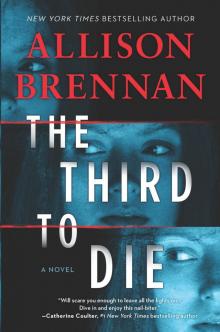 The Third to Die
The Third to Die Nothing to Hide
Nothing to Hide No Way Out
No Way Out Cold as Ice
Cold as Ice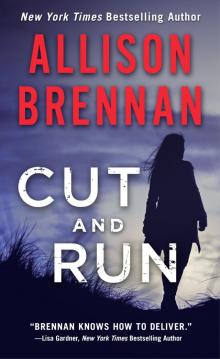 Cut and Run
Cut and Run No Way Out (Lucy Kincaid Novels)
No Way Out (Lucy Kincaid Novels) Storm Warning
Storm Warning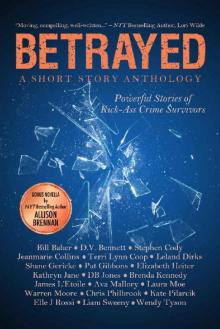 Betrayed: Powerful Stories of Kick-Ass Crime Survivors
Betrayed: Powerful Stories of Kick-Ass Crime Survivors Killing Fear pb-1
Killing Fear pb-1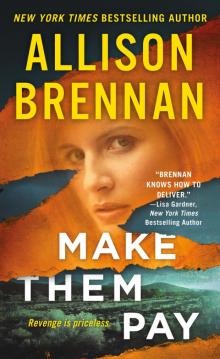 Make Them Pay
Make Them Pay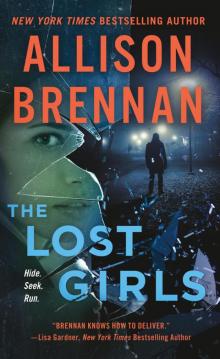 The Lost Girls
The Lost Girls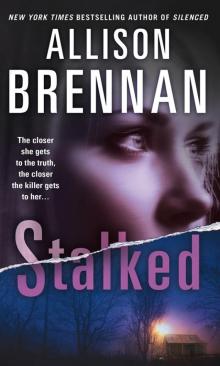 Stalked
Stalked Killing Justice
Killing Justice A Deeper Fear
A Deeper Fear Poisonous
Poisonous Fear No Evil
Fear No Evil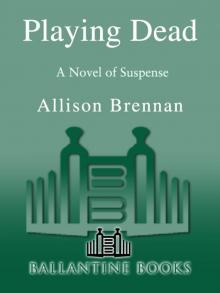 Playing Dead
Playing Dead Cold Snap
Cold Snap Vacation Interrupted
Vacation Interrupted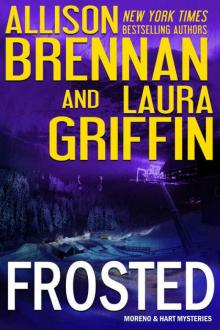 Frosted (Moreno & Hart Mysteries)
Frosted (Moreno & Hart Mysteries)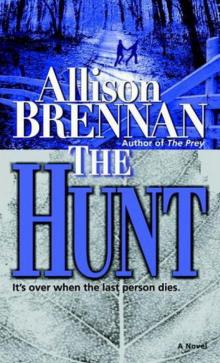 2 - The Hunt
2 - The Hunt Stolen
Stolen No Good Deed
No Good Deed Cutting Edge
Cutting Edge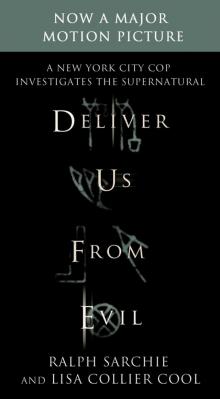 Deliver Us from Evil
Deliver Us from Evil If I Should Die
If I Should Die Speak No Evil
Speak No Evil Silenced lk-4
Silenced lk-4 Original Sin sds-1
Original Sin sds-1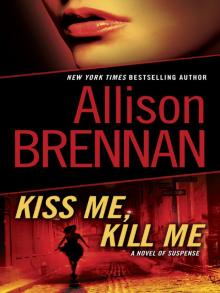 Kiss Me, Kill Me lk-2
Kiss Me, Kill Me lk-2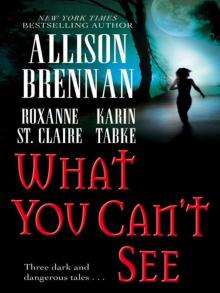 What You Can’t See
What You Can’t See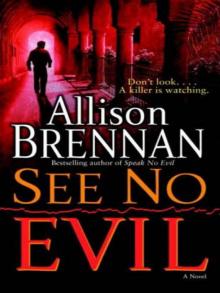 See No Evil
See No Evil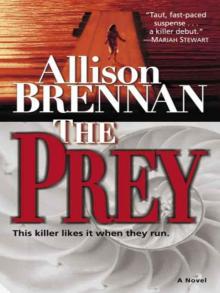 The Prey
The Prey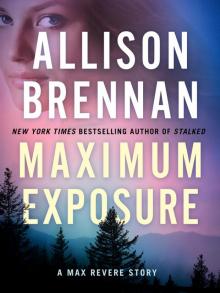 Maximum Exposure
Maximum Exposure Fatal Secrets f-2
Fatal Secrets f-2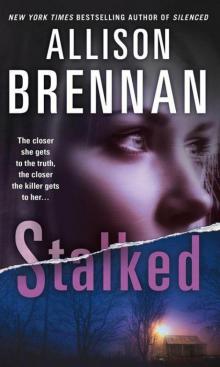 Stalked lk-5
Stalked lk-5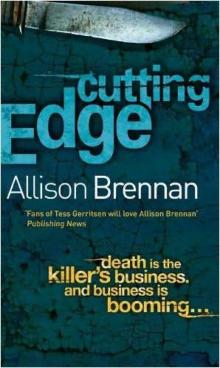 Cutting Edge f-3
Cutting Edge f-3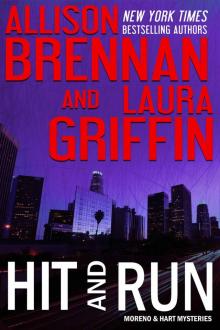 Hit and Run (Moreno & Hart Mysteries)
Hit and Run (Moreno & Hart Mysteries)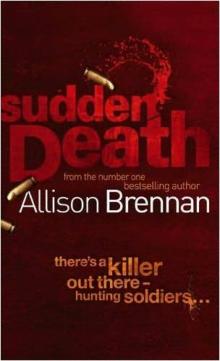 Sudden Death f-1
Sudden Death f-1 If I Should Die lk-3
If I Should Die lk-3 Notorious
Notorious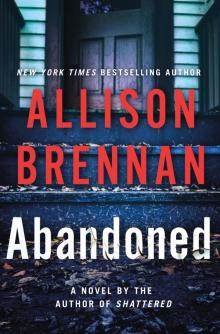 Abandoned
Abandoned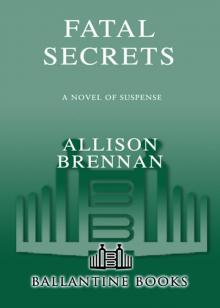 Fatal Secrets
Fatal Secrets The Hunt
The Hunt Carnal Sin sds-2
Carnal Sin sds-2 Love Is Murder
Love Is Murder Lost and Found
Lost and Found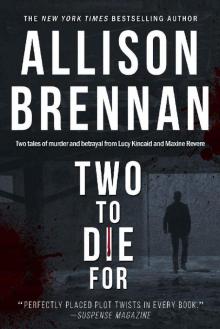 TWO TO DIE FOR
TWO TO DIE FOR Breaking Point
Breaking Point Best Laid Plans
Best Laid Plans Carnal Sin
Carnal Sin Silenced
Silenced Dead Heat
Dead Heat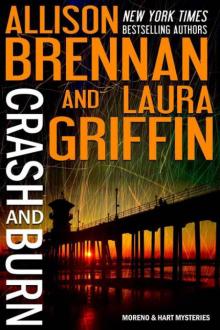 Crash and Burn
Crash and Burn Sudden Death
Sudden Death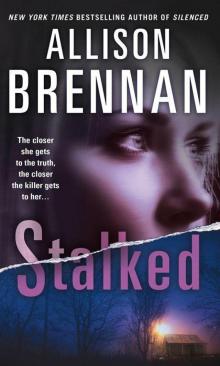 Lucy - 05 - Stalked
Lucy - 05 - Stalked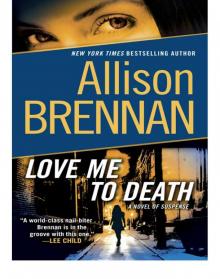 Mortal Sin
Mortal Sin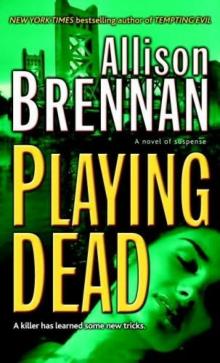 Playing Dead pb-3
Playing Dead pb-3 Kiss Me, Kill Me
Kiss Me, Kill Me Original Sin: The Seven Deadly Sins
Original Sin: The Seven Deadly Sins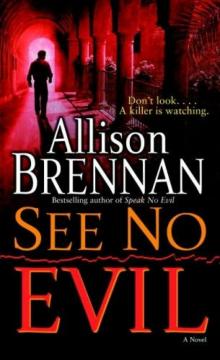 See No Evil e-2
See No Evil e-2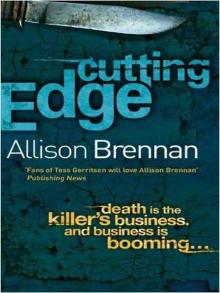 Cutting Edge: A Novel of Suspense
Cutting Edge: A Novel of Suspense Original Sin
Original Sin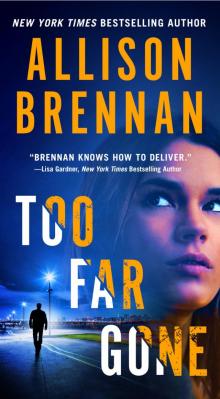 Too Far Gone
Too Far Gone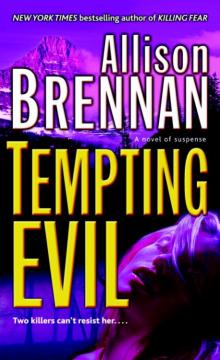 Tempting Evil
Tempting Evil Shattered
Shattered Killing Fear
Killing Fear Murder in the River City
Murder in the River City Love Is Murder (lucy kincaid)
Love Is Murder (lucy kincaid) Stolen (Lucy Kincaid Novels)
Stolen (Lucy Kincaid Novels)